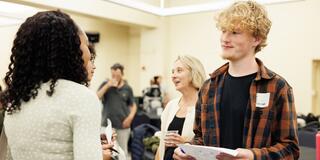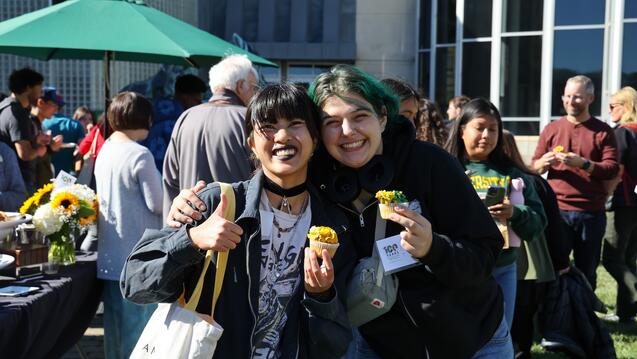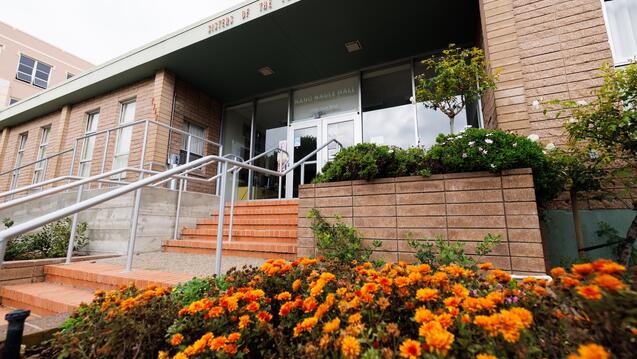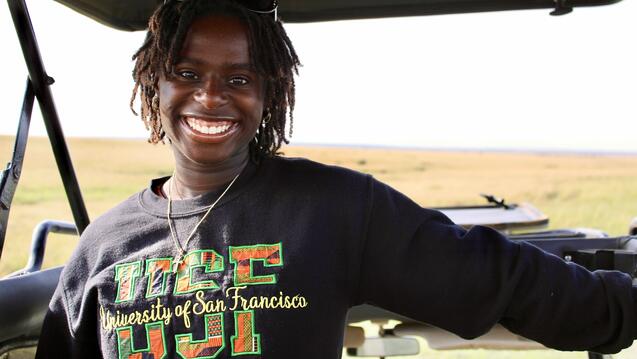In Horizon Collective, Different Majors Meet, Mix, and Collaborate

In a new program on the Hilltop, 115 first-year students from 13 majors are working to solve the world’s most pressing problems — while they’re still in school.
“The Horizon Collective is four years of applied learning at the intersection of sustainability, health, and technology,” said Eileen Fung, provost and vice president of academic affairs. “That’s where the world’s biggest challenges are — and where the jobs are.”
Hannah Martin ’29 said that she and her Horizon classmates just finished their mental health module. “We talked about eco-anxiety and about how climate change is really scary but it’s also a problem that we need to solve.”
Each student used AI to build a wellness app. “I created an appreciate-nature app,” Martin said. “You can log things that you feel grateful for as you go through your day, and if you’re outdoors and you open your camera, you can take pictures of plants and trees and learn about them.”
Why an appreciate-nature app?
“We know that today, as a society, we’ve shifted away from nature. We’re isolated in our rooms, we’re meeting through Zoom, and we spend a lot of time at our desks looking at computers. But when you walk outside and interact with plants, feel-good hormones like serotonin and dopamine are released in your brain. I think it’s really important for our mental well-being to be outside more, and my app encourages you to do that.”
When Martin first heard the assignment to create an app, she balked.
“I was like, I’m an environmental science major. I don’t know how to code. But then, it probably took me 20 minutes to start an app because the professors explained it so well. I think it’s important for us to learn how to use these AI tools, because AI is going to become a part of everyone’s life.”
For her app assignment, Horizon student Enia Guerra ’29 created a workout tracker. “When you press start, it asks you what kind of workout you’re doing and then it asks how you’re feeling in that moment. And then after you finish your workout, the app again asks you how you feel,” she said.
“When you take time to reflect, you realize that before you did your workout you were feeling sad or stressed, but now you feel good. It helps to see your good feeling represented visually on your phone: seeing is believing. When you can actually chart your happiness, you’re more likely to make exercise a habit — a healthy habit.”
The Horizon Collective is a step-by-step path to professional success, Fung said. In their first year, Horizon students learn how different majors can work together to address challenges. In their second and third years, they work on real-world projects with faculty and with partners in industry, community, and government. In their fourth year, they do a capstone project or a culminating experience such as an immersion trip.
Guerra said she joined the Horizon Collective because it encourages her to take action. “What intrigued me in particular was the intersection of AI and climate change and being able to tackle issues that go with that, because I want to use my computer science major to help people or to help the world, and I know that AI doesn’t help the climate at all.”
Zachary Harris ’29, a finance major, said the Horizon Collective was one of his top reasons for applying to USF. “I think collaborating with other majors is the best way to learn and grow. I also like how hands-on Horizon is. Just the other day, we got to do forest bathing or yoga or gardening. Gardening is just one of those experiences where it’s like, wow, this is really great. But I never would have done that by myself.”
What would Harris say to a high-school student who is thinking about the Horizon Collective?
“I would say you should apply if you’re looking to go above and beyond — and gain some new experiences that you can put on your resume. For me, I just wanted to be a part of this first cohort, the pilot cohort, to see if this Horizon Collective is something that benefits students. I think it really does benefit students. I hope it becomes something that every USF student can do.”


